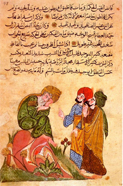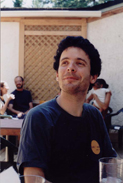Can philosophy help the Middle East?
Can philosophy help the Middle East? McGill University
User Tools (skip):
Can philosophy help the Middle East?
Medieval beliefs put forth to modern students

Socrates and his students in a 13th century Syrian manuscript of al-Mubashshir's work, Mukhtar al-hikam twa-mahasin al-kalim
It was just ten days after fighting between Israel and Lebanon broke out that Professor Carlos Fraenkel was on a plane from Tel Aviv to Montreal with one question turning in his mind: "Can philosophy help solve the problems of the Middle East?"
Having just spent a semester teaching Islamic and Jewish philosophy at Al-Quds, the Palestinian University in East Jerusalem, Fraenkel had many reasons to believe the answer to this question was "Yes."
"Philosophy provides a language through which people can communicate even if they do not accept each other's religious or national commitments," said Fraenkel, who holds a joint appointment in Jewish studies and philosophy at McGill. This was also the conviction of the medieval philosophers, he added, and an idea he discussed with his Palestinian students, who agreed.

Professor Carlos Fraenkel taking a break in Jerusalem.
"I was very curious about what it would be like to teach philosophy in Palestine," said Fraenkel, who taught the course in Arabic and is fluent in Hebrew. "I know Israel well because I studied there for three years, but I'd previously had few opportunities to interact with Palestinians."
Fraenkel said his biggest challenge was getting to the Abu Dis campus in the suburbs of East Jerusalem, which meant navigating al-jidar, the controversial wall Israel is building. "En route to campus, a massive piece of concrete suddenly grows out of the street. I had to climb up the wall of a neighbouring garden to pass over to the other side, careful not to slip. From there I took a taxi to the campus," said Fraenkel. Al-Quds also has a campus in the Old City, but many students are not permitted to cross the border.
Fraenkel co-taught the seminar with Professor Sari Nusseibeh, the president of Al-Quds, and a renowned Palestinian intellectual and politician who in the past was the PLO's chief representative in Jerusalem.
In 2003, Nusseibeh gave a lecture at McGill where he advocated non-violence as the "logical method" for peace between Israelis and Palestinians. "If peace is not achieved, then the lives of both sides will not be worth living," he said. Three security guards were at each door of the Shatner Building during the lecture.
Reached in Jerusalem last week, he said, "Philosophy can save not only the Middle East, but all areas where there is conflict between human beings, if we are being guided in our thoughts and actions by reason and universal moral values." However, he warned against mistaking true philosophy for "mental skills or cleverness or suchlike," adding, "We are bound to clash when we end up imposing our own values on others using all the mental skills we have to do so."
Fraenkel described the class discussions as lively, focused and generally free of stereotypes. "Sometimes, out of curiosity, the students asked me personal questions but neither my Jewish background nor my ties to Europe, Israel and North America had a negative impact on our interaction," said Frankel, noting that one of the two top students in the class was a member of the Hamas faction on campus.
"I don't think that the stereotypes dissolved entirely, but I think they are at least temporarily suspended in the personal encounter. And this can initiate a kind of philosophical questioning, not unlike the one Socrates advocated in ancient Athens."

